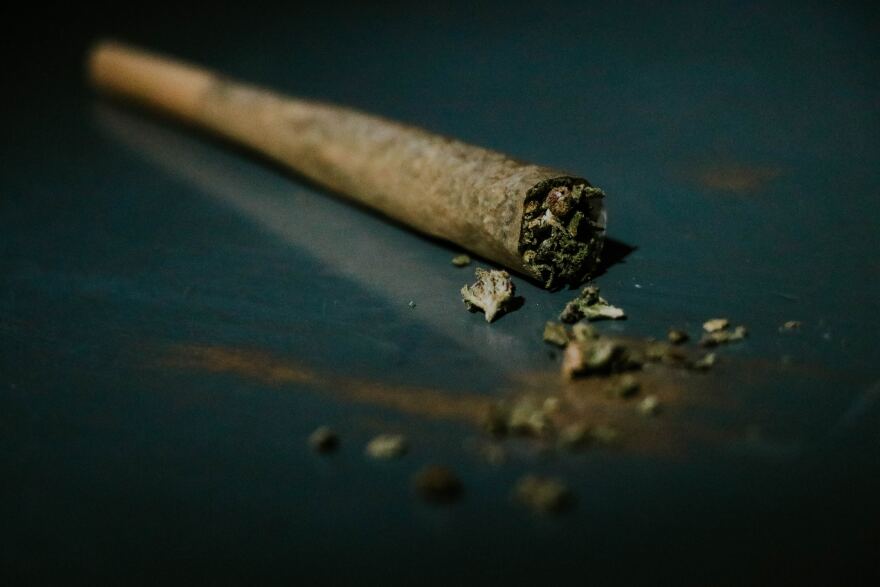A new public health survey says that support for marijuana legalization in Pennsylvania decreased for the first time in a decade.
The Muhlenberg College Public Health Program’s 2023 Pennsylvania Health Survey, which was conducted this spring, found that 50% of Pennsylvanians supported the complete legalization of marijuana, down from 56% in 2022.
Muhlenberg College said it has been tracking public support for legalization, and that since 2013 support for the measure had been steadily increasing from 33% to a peak of 58% in 2021.
The survey notes that, “the small shift in opinion on this matter may simply be the product of sampling error, but for the first time in a decade support for legalization did not rise in the Commonwealth.”
Opposition to complete legalization also rose to 31% in 2023 compared to 25% in 2022. In 2013, 40% of Pennsylvanians said they were opposed.
The percentage of Pennsylvanians who were neither in favor nor opposed to legalization remained the same between 2022 and 2023, at 18%.
Another question asked how concerned respondents were about increased marijuana use among people aged 18-22. Of those polled, 22% said they were “very concerned,” 33% were “somewhat concerned,” 27% were “not too concerned,” and 18% were “not at all concerned.”
The report was a result of a telephone survey of 417 adult Pennsylvania residents. Muhlenberg College said the margin of error was +/-6% at a 95% level of confidence.
Former Gov. Tom Wolf signed legislation in 2016 legalizing medical marijuana in Pennsylvania. The first sales at dispensaries began in 2018.
Earlier in July, a bill was introduced by State Sens. Dan Laughlin, R-Erie, Sharif Street, D-Philadelphia, Timothy Kearney, D-Delaware, Wayne Fontana, D-Allegheny, and John Kane, D-Chester/Delaware that would legalize adult use of marijuana.
Among its changes, Senate Bill 846 would:
- Expunge nonviolent marijuana offenses stemming from arrests or convictions under the 1972 Controlled Substance, Drug, Device, and Cosmetic Act.
- Create a Cannabis Regulatory Control Board to take over some oversight duties from the Pennsylvania Department of Health, and handle dispensary permit and application processing.
- Set the minimum age to use marijuana at 21 years old, prohibit the marketing of marijuana products to children, and establish appropriate packaging warnings.
- Set an 8% sales tax on cannabis and cannabis-infused edible and nonedible products, and a 5% excise tax on sales at dispensaries.
- Allow adults to cultivate up to five cannabis plants for personal use.
- Set possession limits at 30 grams of cannabis flower, no more than 1,000 milligrams of THC contained in cannabis-infused edible or nonedible products, or five grams of cannabis concentrate.
In a release, Laughlin said that during 2021 state budget hearings, the Senate Appropriations Committee was told by the Pennsylvania Independent Fiscal Office that legalized adult-use marijuana could generate between $400 million and $1 billion in new tax revenue.
The Muhlenberg College survey also queried respondents about the federal and state handling of the COVID-19 pandemic, mental health, the opioid epidemic, climate change, and healthcare within Pennsylvania.
Some of the survey’s 2023 findings included:
- 66% of Pennsylvanians described the general quality of healthcare in Pennsylvania as “excellent” or “good,” compared to 25% who rated it as “fair” and 7% that said it was “poor.” The survey said the percentage of positive ratings is the highest since the start of the COVID-19 pandemic.
- 86% of registered Democrats said they received at least one COVID-19 vaccine, compared to 63% of Republicans and 77% of independents.
- 79% of Republicans said they were “not too concerned” or “not at all concerned” about getting seriously sick from COVID-19, compared to 66% of Democrats and74% of independents.
- 55% of respondents said they know someone who has been addiction to heroin or another opiate, and a majority of Democrats (75%), Republicans (73%) and independents (68%) said the state was not doing enough to combat the epidemic.
- 39% of Pennsylvanians said that one of their family members has experienced a severe mental health crisis.
- 53% of Pennsylvanians said mental health issues in children and adolescents are a crisis, compared to 43% who said they are a “problem but not a crisis.”
- 65% of respondents aged 18-29 saw their mental health as “excellent” or “good,” while 9% felt their mental health was “poor.” For Pennsylvanians over age 30, 82% viewed their mental health as “excellent” or “good,” and only 3% perceived their mental health as “poor.”
- 46% of Democrats consider climate change to be a crisis compared to just 11% of Republicans. 39% of Republicans said climate change was “a problem but not a crisis” and 46% said it was “not a problem,” compared to 34% and 16% of Democrats, respectively.
The full public health survey can be found online here.
(Original air-date: 7/24/23)



